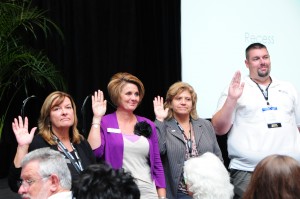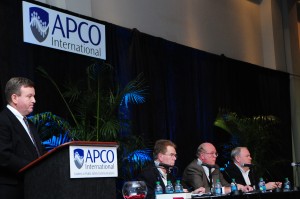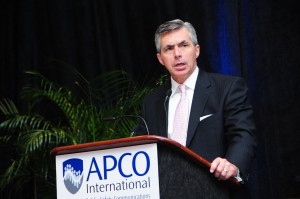Working Toward Interoperability
“I’m proud to report that our association is healthy and strong,” said APCO International Interim Executive Director Mark Cannon, during the Second General Business Session on Aug. 9. The meeting turned into an event, with a presentation from FCC Public Safety & Homeland Security Bureau Chief Adm. James Arden Barnett Jr.
APCO President Bill Carrow called the session to order and dove into the agenda: the election of the first and second vice presidents. Both candidates, Terry Hall for first vice president and Mike Jeffres for second vice president, were running unopposed. The election was held via written ballot. The results were announced at the end of the meeting:
Hall advanced to the position of first vice president. However, Jeffres did not receive enough votes. Thus, the position of second vice president remains vacant for now. In accordance with the association’s bylaws, APCO President Gregg Riddle will appoint an individual to serve. The appointment must be confirmed by the Board of Directors.
Cannon gave the State of the Association address. He highlighted 10 achievements of the past year, including the financial stability of the association, its growth internationally, the refreshing of its brand and its work on the D Block legislative initiative.
From the FCC
In a meeting high point, Adm. Jamie Barnett took the podium: “Interoperability must be a high priority,” he said. A former Navy communications officer, Barnett addressed the Quorum in a sprit of cooperation and seriousness for the mission at hand.
“I’m also aware of those who are not here as we stand just over a month away from the 10-year anniversary of when they were taken from us,” he said, taking attendees back to 9/11. “The good news of that terrible day was that thousands and thousands of people were saved because of the work of first responders, and they had to have communications to do that. But we know that some of those first responders were kill because of the problems with interoperability and communications. It weighs heavy on those here and us at the FCC. It drives us at the FCC to ensure the promise of nationwide interoperable broadband service [is kept].”
Throughout his presentation Barnett addressed how the “promise of interoperability” made by Congress after the release of the 9/11 Commission’s Report can be realized and the FCC initiatives that greatly affect pubic safety.
According to Barnett, interoperability, which saves lives, doesn’t just happen, and in fact many forces in today’s broadband market are pulling it away from true interoperability. He noted that interoperability to also costly and money is always a local issue, but “the sooner we get going on this [network], the more affordable it will be. FCC can help fund this with optional, voluntary spectrum auctions,” said Barnett.
He was also candid about influence of propriety technology and the industry, saying, “Interoperability is not inevitable. It really could split away from us and go down the same path as LMR. It’s not possible to retrofit interoperability. We don’t want to see interoperability going down the same path for broadband that it has in other mediums.”
He also noted that broadband interoperability won’t wait, and that 22 waivers had been granted by the FCC for regions to begin building out broadband systems today in the existing 700 MHz spectrum for public safety.
Barnett did not address the D Block, except to say that he respects APCO’s position and hopes the matter will be resolved quickly.
“The seeds of non-interoperability are being sowed for this network, and we cannot continue to let it grow,” he said.
Regarding the FCC narowbanding mandate, the Commission has worked hard to raise awareness about the Jan. 1, 2013, deadline, sending out thousands upon thousands of letters to organizations with existing wideband licenses and holding workshops. APCO has also worked to raise awareness. Since July, there has been a 12% decrease in the number of wideband-only licensees.
“There are still 63,000 call signs that remain wideband only,” Barnett said. The FCC issued a public notice reaffirming the deadline, but also establishing a waiver process for jurisdictions facing extraordinary circumstances. “But there are not going to be any blank waivers granted,” he said. “Narrowbanding now is really a top priority.”
On Next Generation 9-1-1, Barnett discussed the unveiling of the Personal Localized Alerting Network in New York City. The network is designed to send emergency alerts to an enabled cell phone within a specific affected cell tower radius.
On 800 MHz rebanding, Barnett noted that much progress has been made. The Commission has finalized a border agreement with Canada and is actively working on one with Mexico. “1.3 million radios and 3,400 sites have already been retuned,” he said.
Barnett also noted that a nationwide test of the Emergency Alert System will be conducted on Nov. 9, 2011, at 2 p.m. Eastern. Comm center personnel should be aware of the date and time and be prepared for a possible influx of calls from people trying to determine if a true emergency exists.
In conclusion, Barnett stressed the importance of having a dialogue to make advancements. “I look forward to our continued work today for interoperability and improved public safety communications,” he said. “I pledge my best efforts to you and to your leaders here to engender that trust.”

The members of the Board of Directors: (from left) Julie Righter, Gigi Smith, Debbie Gailbreath and David Clemons.
Final Business
Bill Carrow concluded the meeting by swearing in the four regional representatives of the Board of Directors who were elected during the Executive Council meeting on Aug. 5. Three representatives, Dave Clemons from the East Coast Region, Julie Righter from the North Central Region and Gigi Smith from the Western Region, were reelected to their positions for a final two-year term. Debbie L. Gailbreath, RPL, from Florida Chapter was elected to the Board as representative of the Gulf Coast Region.



